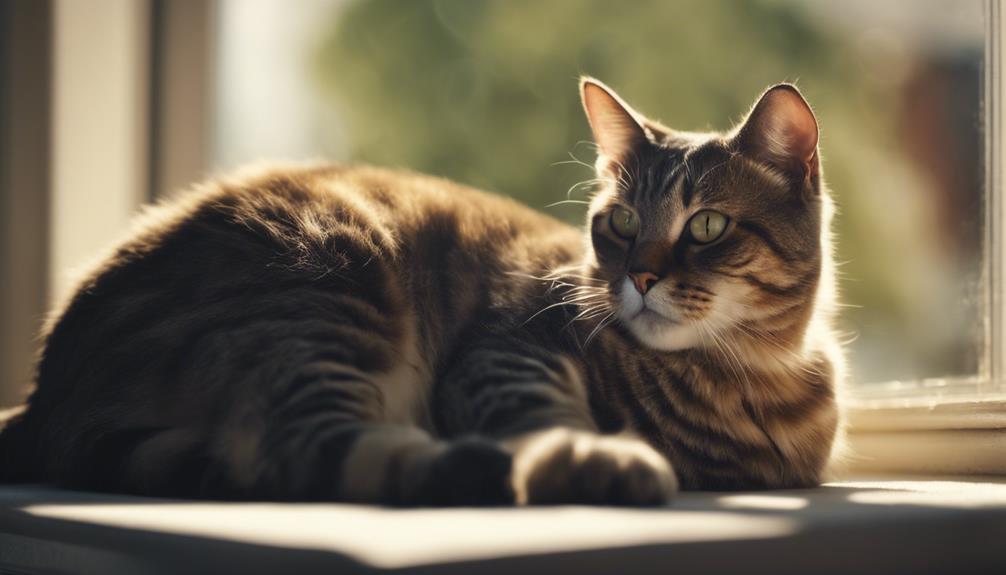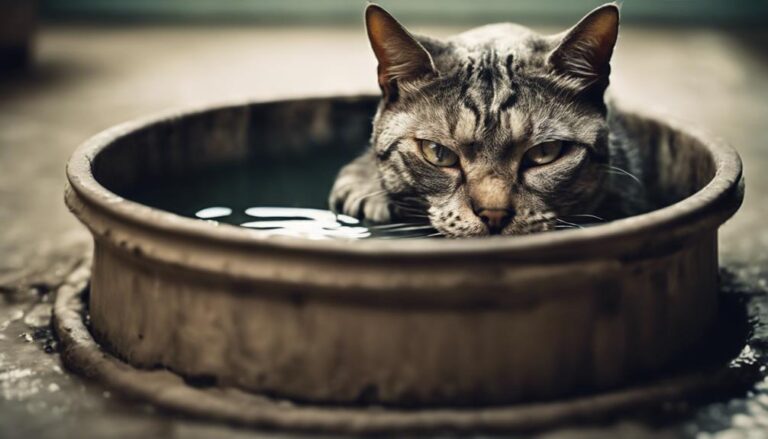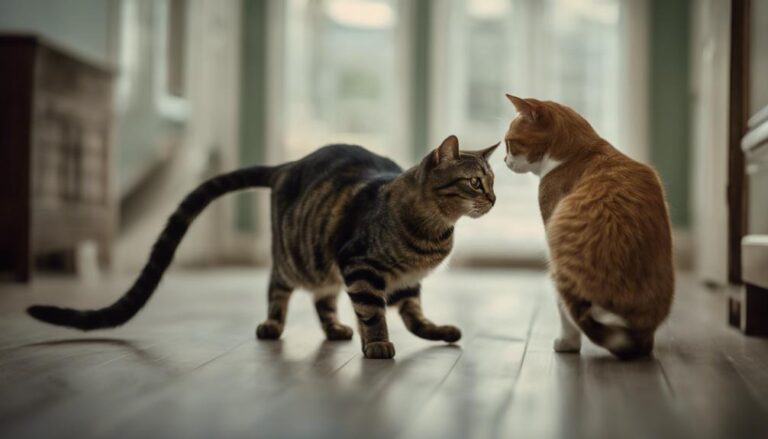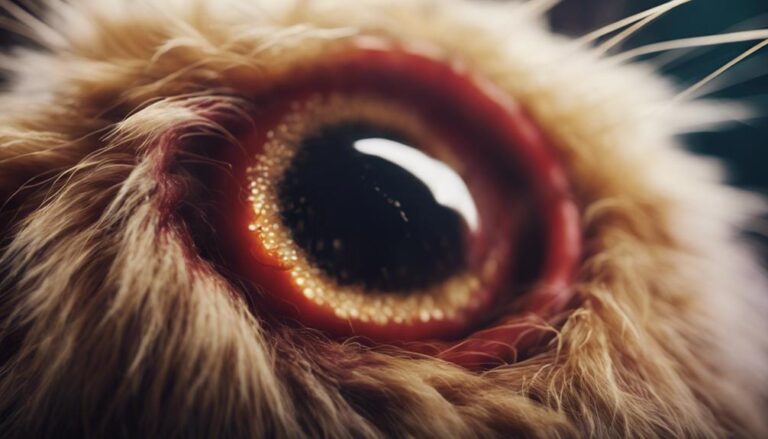Have you ever wondered how Gabapentin, the renowned miracle drug for anxious cats, works its magic to alleviate feline anxiety? The mechanism behind this medication's efficacy is fascinating, targeting specific neurotransmitters in the brain to bring about a calming effect. But that's just the beginning; understanding the dosage guidelines, administration techniques, and its overall impact on your feline friend's well-being unveils a world of possibilities. Stay tuned to unravel the mysteries of this groundbreaking solution for anxious cats.
Understanding Gabapentin for Cats
When administering gabapentin to anxious cats, understanding its mechanism of action is crucial for ensuring its effectiveness in reducing stress and anxiety. Gabapentin, a commonly used medication for cats experiencing stress, has been shown to significantly lower stress levels in felines with just a single dose of 100mg. Even lower doses, such as 50mg, have proven effective in alleviating stress in these animals.
Mechanism of Action
Gabapentin functions by blocking excitatory transmitters in the brain, which effectively reduces anxiety in cats. This mechanism of action helps calm the feline mind, promoting a sense of safety and relaxation. Understanding how gabapentin works can give insight into its efficacy in managing anxiety in cats.
- Feline Brain Chemistry: Gabapentin targets specific neurotransmitters in the feline brain, modulating their activity to reduce anxiety levels.
- Anxiety Reduction: By blocking excitatory signals, gabapentin lowers the overall anxiety experienced by cats, helping them cope better with stressful situations.
- Quality of Life Improvement: The drug not only alleviates immediate anxiety but also contributes to an overall improvement in the feline's well-being and quality of life.
- Optimal Dosing: Proper dosing is crucial to ensure that the cat receives sufficient anxiety relief without becoming overly sedated, striking a balance that maximizes the drug's benefits.
Dosage Guidelines and Administration
Properly determining the appropriate dosage and administration schedule is crucial for effectively using gabapentin to manage anxiety in cats.
The recommended gabapentin dosage for cats typically falls within the range of 50-100 mg, taking into account the feline's weight and level of anxiety.
This medication can be administered orally in pill or liquid form, preferably 2-3 hours before a stressful event to maximize its anxiety-relieving effects.
Ensuring the correct dosage is essential to provide relief from anxiety without inducing excessive sedation in cats.
It's advisable to give gabapentin with food to reduce the likelihood of stomach upset and enhance absorption.
Consulting a veterinarian is imperative in determining the most suitable gabapentin dosage and administration schedule tailored to the specific needs of each cat.
Efficacy in Reducing Stress
Gabapentin's stress-reducing effects in cats have been supported by studies showing significant decreases in stress levels and respiratory rates following its administration. Owners reported lower stress scores in cats receiving gabapentin compared to a placebo, indicating its efficacy in calming anxious felines during transportation and veterinary visits.
Improved compliance scores further emphasize gabapentin's potential as a stress-relieving agent, suggesting behavioral changes that make handling cats easier in stressful situations.
Stress Reduction Mechanism
With its demonstrated ability to reduce acute stress in cats undergoing veterinary procedures, gabapentin has shown promise as a stress-reducing agent in feline care. When considering the stress reduction mechanism of gabapentin, it's essential to understand how this medication alleviates fear, anxiety, and stress in cats.
- Neurotransmitter Regulation: Gabapentin affects neurotransmitters in the brain, helping to calm anxious responses.
- Pain Perception Modulation: By modulating pain perception, gabapentin can reduce the stress associated with discomfort.
- Sedative Properties: Gabapentin's sedative effects can help cats relax in stressful situations.
- Overall Calming Effect: Gabapentin's overall calming effect on the central nervous system contributes to its stress-reducing capabilities.
Behavioral Changes Observed
When considering the effectiveness of gabapentin in reducing stress in cats, it's evident that behavioral changes observed showcase its efficacy in alleviating anxiety and fear responses. Studies have demonstrated that cats receiving gabapentin exhibit lower stress scores and respiratory rates, indicating a calmer state.
Owners also reported significant stress reduction in their cats after treatment with gabapentin, highlighting its beneficial effects on anxiety-related behaviors. Additionally, the drug has been found to improve compliance scores and ease of handling during veterinary examinations, further emphasizing its role in reducing stress and fear in feline patients.
Comparing Dosage Options
Comparing various dosage options can help determine the most effective and safe amount of gabapentin for your anxious cat. When considering gabapentin dosage options, proper dosing is essential for achieving anxiety relief without causing over-sedation. To help you make an informed decision, here are some key points to consider:
- Range of Dosage: Gabapentin dosage for cats typically ranges from 50mg to 200mg per dose, depending on the cat's weight and anxiety level.
- Effectiveness: Studies have shown that a single dose of 100mg of gabapentin can effectively reduce stress in cats during transportation and veterinary examinations.
- Lower Doses: Lower doses, such as 50mg, have also been found to be effective in reducing stress and anxiety in cats before stressful events.
- Consultation: Consultation with a veterinarian is crucial to determine the appropriate gabapentin dosage based on the individual cat's needs and health status.
Long-Term Effects and Considerations
To ensure the safe and effective long-term use of gabapentin for your anxious cat, understanding the potential effects and considerations is imperative.
While gabapentin is generally safe for long-term use in cats, those with kidney or liver diseases may require dosage adjustments. It's essential to have regular veterinary monitoring as there's limited research on the long-term effects of gabapentin in cats.
When administering gabapentin to multiple cats, dosage adjustments may be necessary to ensure optimal effectiveness. Gabapentin has shown effectiveness in managing chronic pain conditions such as arthritis and neuropathic pain in cats over extended periods.
Consulting with a veterinarian is crucial to determine the appropriate duration and dosage of gabapentin for long-term use in your cat. By staying informed about potential side effects, considering long-term use implications, and making necessary dosage adjustments, you can help ensure the well-being of your anxious feline companion.
Safety Profile and Side Effects
Understanding the safety profile and potential side effects of gabapentin in cats is essential for responsible pet owners. When considering using this medication for your feline companion, keep the following key points in mind:
- Side Effects: Gabapentin can cause common side effects in cats, including sedation, mild drowsiness, and possible gastrointestinal issues.
- Allergic Reactions: While rare, allergic reactions to gabapentin may occur in some cats, requiring immediate veterinary attention.
- Administering with Food: Giving gabapentin with food can help reduce the likelihood of stomach upset in cats.
- Duration of Side Effects: Most reported side effects of gabapentin, such as drowsiness, typically resolve within 12 hours after administration.
Frequently Asked Questions
Does Gabapentin Help Cats With Anxiety?
Yes, gabapentin helps cats with anxiety by reducing stress and promoting calmness. It blocks excitatory transmitters in the brain, managing anxiety triggers. Proper dosing is crucial for anxiety relief without over-sedation. It doesn't cure anxiety but significantly helps manage it.
How Quickly Does Gabapentin Work on Cats?
Gabapentin typically starts working in your cat within 1-2 hours, peaking around 2-3 hours. Its calming effects can last 8-12 hours, but onset may vary. Consistent dosing and timing are crucial for optimal anxiety relief.
What Happens if I Give My Cat Too Much Gabapentin?
If you give your cat too much gabapentin, it can lead to severe sedation, disorientation, and wobbliness. Overdosing may cause vomiting, diarrhea, and breathing issues. Serious complications like seizures or coma can occur. Seek immediate veterinary help to prevent harm.
How Quickly Does Gabapentin Work for Anxiety?
When you give gabapentin to your anxious cat, it typically starts working within 1-2 hours. The calming effects can last 8-12 hours, making it a valuable tool for managing acute anxiety quickly before vet visits or other stressful events.






